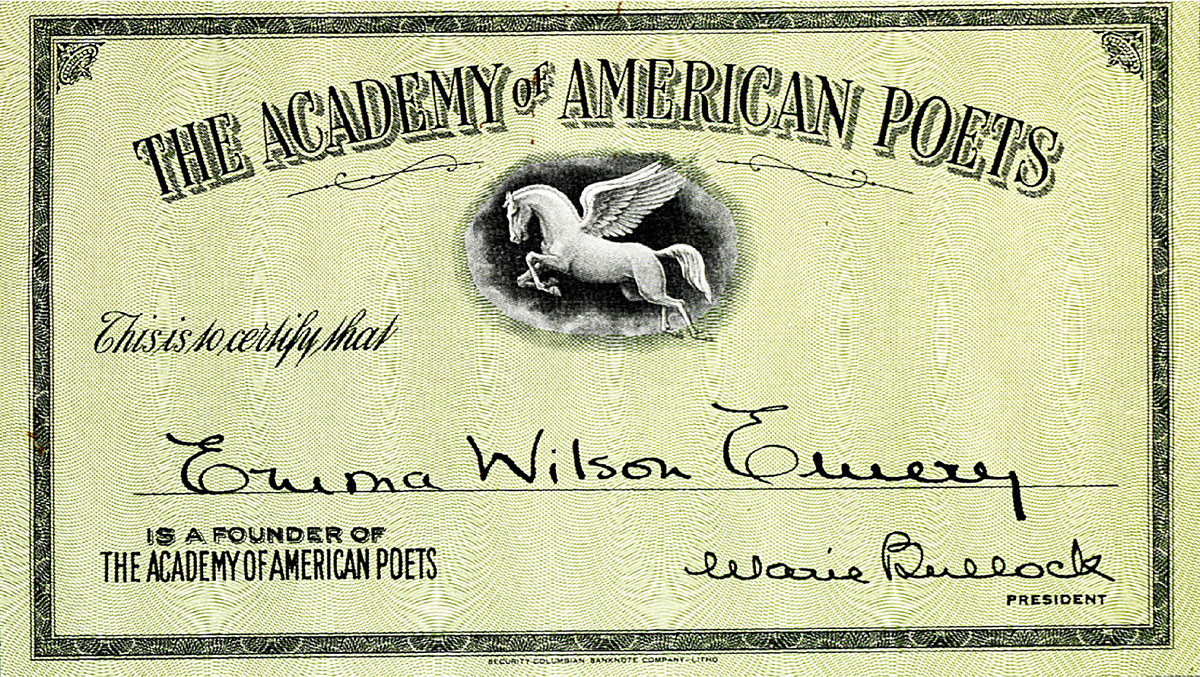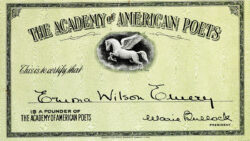Emma Wilson Emery
Louisiana’s first and longest-serving poet laureate, Emma Wilson Emery wrote poetry about romance, nature, and anti-war sentiments.

Hill Memorial Library at Louisiana State University
Emma Wilson Emery’s Academy of American Poets membership card.
Emma Wilson Emery was Louisiana’s first and longest-serving poet laureate, a post she held from 1942 to 1970. A popular poet of her era, she is not often read or remembered by readers today.
Emery was born in East Texas in 1885. Her parents, David Henry Wilson and Eula Gilmore, hailed from Spurger, a pine timber town founded by his grandfather near the Neches River. The couple eloped—as the Wilson family was prejudiced against Gilmore’s Cherokee heritage—and headed south to Plank, a recently established sawmill town. Baby Emma was born in a covered wagon, she liked to say, “moving across the plains of Texas.”
The Wilsons followed the longleaf pine industry to central Louisiana, outside the town of Boyce, in Rapides Parish. Emery’s memoirs mention participating in a poetry recital at the age of eight, when she embarrassed herself on stage by tripping over her own sagging undergarments. Emma—who went by Emm—eventually moved to Shreveport, where she graduated from nursing school, founded the city’s Red Cross chapter, and supervised nurses during the First World War. There, she married one of her patients, Robert Emery.
Emma Wilson Emery’s debut poetry collection, Velvet Shadow, published by New York’s Parnassus Press, appeared in 1934. The book contains conventional rhyme scheme poems, many on the subject of romance and nature, most with Christian tones. But the strongest lines of verse throughout are resolutely anti-war.
“Let not another lad go forth,” she writes in a poem of the same name, “With the light of youth in his eye; / A smile on his lips, a gun in his hand; / A lad too young to die.”
“Out of the holocaust I try / To find a reason to justify / The spilling of warm, young blood— / Dear God, is there an answer? Why?” she writes in a poem titled “Guns at Dawn.”
Around the same time, Emery relocated to Chicago, where she wrote and produced for CBS Radio’s popular Poetic Melodies program. She published a second collection, Bleeding Heart and Rue, a compilation of her radio pieces, in 1937. Her third, Songs of Victory (1944), returned to the theme of war and peace.
In 1942, Governor Sam H. Jones named Emery, who had returned to Shreveport, Louisiana’s first poet laureate. Her poems were frequently published in local and national newspapers, but most popular and republished among them was “Lovely Louisiana,” (“In the whole wide world I have found no place / Like lovely Louisiana”), which was printed in state textbooks, distributed on pocket-sized cards to homesick military members during World War II, and nearly voted the official state song. A memoir, Aunt Puss & Others: Old Days in the Piney Woods (1969), would be her final book. She remained Louisiana’s poet laureate until her death in 1970.
